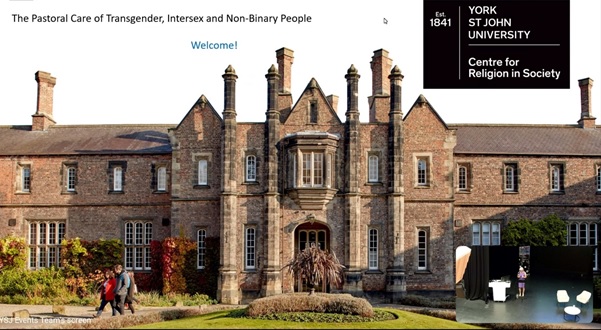Ross Stirling-Young, a third-year ordinand in the Scottish Episcopal Institute, recently attended a conference entitled ‘The Pastoral Care of Transgender, Intersex and Non-Binary People’ offered by York St John University on Thursday 7 & Friday 8 September 2023. Ross writes, ‘As an openly gay Christian, I’m passionate about living out what the SEC stands for. That is, a Church that is diverse in its tradition, outlook and culture. As a full-time mixed-mode ordinand, I was recently interviewed by a youth-group member regarding transgender inclusion within places of faith. One of the group’s young people is beginning his transition journey and asked me a very deep and concerning question, ‘Why doesn’t God love me?’ I realised then that I, too, had a similar type of question when I was much younger. As someone who had been a member of a toxic church environment, I went through an experience of self-actualisation and empowerment when I left as a young teenager. As part of that journey, I came to love myself and to understand how much God loves me.
Chrissie Chevasutt, a United Reformed Church outreach worker for transgender, intersex and non-binary communities, said, “We need to love, serve, and create an environment for people to heal, thrive and flourish”. In her important work, one project for 2024 is to enable churches throughout the UK to become known as ‘sanctuary churches’ for the trans community. Accredited modules via online learning would be available to clergy and pastoral staff. I, for one, hope and pray this plan comes to fruition and that the SEC is part of such an offering.
If we are to be like Jesus and to minister to those who are different, marginalised and treated as outcasts, then we need to do more than label our churches and websites with messages of ‘all are welcome’. Jesus commanded that we should go out and meet people where they are. For me, this conference has been the start of a process in which to come to greater awareness of how I can be an ally, to reach out and to let transgender people know that they have a place in the Church.
I must add that in my own naivety, it may seem that what I suggest for myself (and perhaps for others) is straightforward and easy. The conference reminded me that we cannot solve the pain of someone’s transition. But what we can do is move beyond inclusion to liberation. I and many others can offer a place to be, to sit, to be themselves and to be listened to.
Jay Hume, Poet-in-Residence at St Giles in the Fields, said, “Many Churches hate me because I disturb the sense of who they are”. I sincerely agree that there may be churches out there who fit this category. Jesus himself disturbed the dictators of the empire, and as a Jewish Palestinian Carpenter, He brought down the greatest empire ever known, said Chrissie in her talk.
Chrissie also reminded attendees of several inspiring people such as Martin Luther King, Nelson Mandela and Desmond Tutu. They each spoke for an oppressed people, but it wasn’t only them. It was the people who stood with them, too. As followers of Jesus, we are also called to stand with and alongside the oppressed.
My prayerful intent is to be the person God has called me to be and continue in my understanding and learning to enable the most useful pastoral support I can offer.
Screenshot courtesy of Ross Stirling-Young


